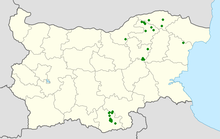Alianes

The Alianes ( Bulgarian Алиани Aliani or Алевии Alewii ) are a Shiite Tariqa , similar to that of the Sufist Mevlevi , whose members live in different regions of Bulgaria . Since the Turkish-speaking Alianas are denominationally related to the Anatolian and East-Thracian Alevis and have ritual and content-related similarities with them, they are also referred to as Alevis .
religion
The Alianes revere ʿAlī ibn Abī Tālib , son-in-law and first cousin of the Prophet Mohammed , whom they consider to be an emanation of God .
Other Muslims consider Alianes heretical because of their view of Imam Ali . The community forms a very closed society and hides its rituals. The Alianes can be assigned to mysticism and believe in a personal understanding with God through a state close to the trance . In contrast to most other Sufi communities, they do not practice traditional Islamic rituals, but use candles and wine, among other things.
history
The exact origin of the community is not certain, as few records have survived from the early days of the order, but according to prevailing theory, they settled in Bulgaria after the victory of the Ottoman sultan Selim I in 1512 over the first Safavid Shah , Ismail I. , down. It is believed that the Alianes were descendants of the Sufi masters who came to the Balkans during the 15th century to maintain the morale of the Ottoman soldiers and to help integrate the conquered peoples into the empire.

In Bulgaria Alianen inhabit mainly the villages Jablanowo and Malko Selo in the province Sliven ; Sewar, Ostrowo, Madrewo, Sveshtari, Biserzi and Lawino in the province of Razgrad ; Preslawci, Tschernik and Bradwari in Silistria ; and Mogilez and Bajachevo in the Targovishte Province .
The Demir-Baba-Tekke has been a sacred place of the Alianes and other Islamic schools since the 16th century, as Demir Baba , a famous dervish who lived in the 16th century, is buried here in northeastern Bulgaria. The Tekke Otman Babas , located in the village of Teketo in the Haskowo region , is also a sacred site of the Aliana.
literature
- Demir Baba's life and the creation of manuscripts by heterodox Muslims in northeastern Bulgaria . (Bulgarian: Житието на Демир Баба и създаването на ръкописи от мюсюлманите от хетеродоксните .).
- Демир баба теке е светиня. (No longer available online.) Formerly in the original ; Retrieved December 28, 2012 (Bulgarian). ( Page no longer available , search in web archives )
- Националният институт за паметници на културата иска да спре реставрацията на Демир баба теке. Retrieved December 28, 2012 (Bulgarian). : The National Institute of Cultural Monuments want to halt the restoration of Demir baba teke
- И. Георгиева: Bulgarian Alians. A collection of ethnographic materials. Sofia 1997 (Bulgarian: Българските алиани. Сборник етнографски материали. ).
- Vesselin Bosakov: Religious and sociocultural dimensions of the Kazalbashi community in Bulgaria . In: Facta Universitatis . tape 2 , no. 6 . University of Niš , 1999, p. 277-283 ( ceeol.com ).
- Burak Gümüş, “About Nusayri, Bulgarian-Alevites, Shabak, Kakai and Ehl-i Hak”, Sosyal Bilimler Araştırma Dergisi (SBArD), Yıl: 7, Sayı: 14, (2009), pp. 153–177
- Jordanka Telbizova-Sack, “The Alevis of Bulgaria - Tradition and New Determination in the Context of Social Change”, in Christian Voss and Jordanka Telbizova-Sack, Islam and Muslims in (Southeast) Europe in the context of transformation and EU expansion , Verlag Otto Sagner, Munich and Berlin, 2010, pp. 173-194
Individual evidence
- ↑ Ĭordan Stefanov: Arkheologicheski pametnit ͡ s ͡ i i istorii ͡ a ͡ na prouchvanii ͡ a ͡ ta v Isperikhskii ͡ a ͡ raĭon: istoriko-arkheologicheski reserve "Sbori ͡ a ͡ novo" . 1st edition. Svi͡a͡t. nauka, Sofija 1997, ISBN 954-8223-36-8 (Bulgarian, limited preview in Google Book Search).
- ↑ Gocha R. Tsetskhladze (Ed.): Ancient Greeks West and East: Edited by Gocha R. Tsetskhladze (= Mnemosyne Leiden / Supplementum: Supplementum . Volume 196 ). Brill, Leiden, The Netherlands 1999, ISBN 90-04-11190-5 , pp. 445 (English, limited preview in Google Book search).
- ↑ Jordanka Telbizova-Sack: Identity pattern of the Pomaks of Bulgaria: a contribution to research on minorities (= Scripta Slavica . Volume 7 ). Biblion-Verlag, Marburg / Lahn 1999, ISBN 3-932331-18-4 , p. 137 ( limited preview in Google Book search).
- ↑ Bosakov, p. 282.